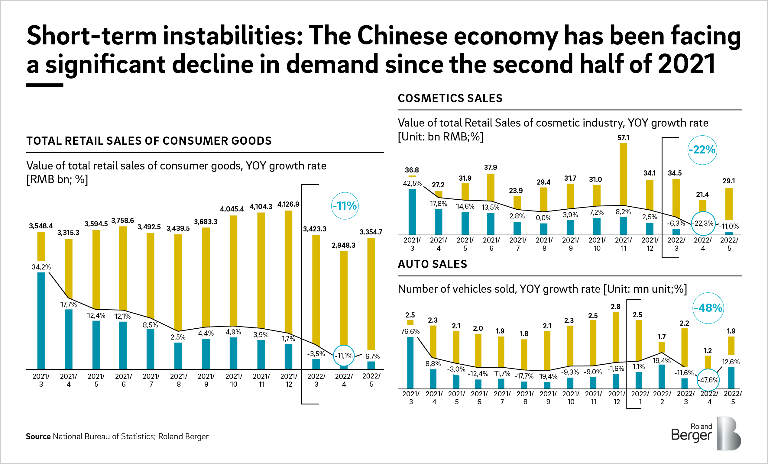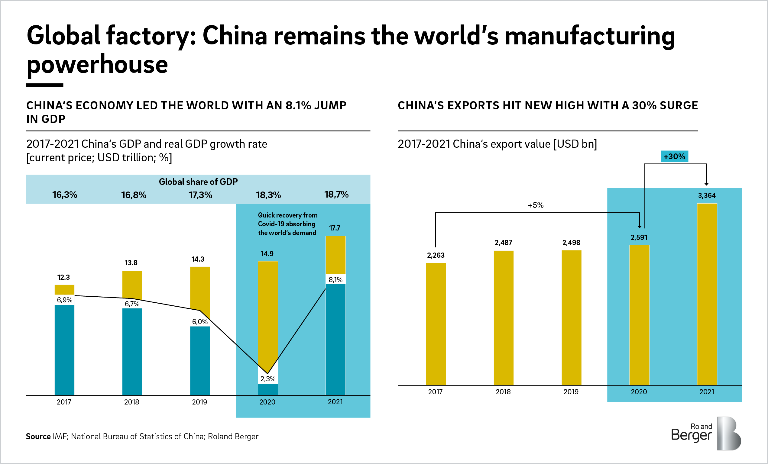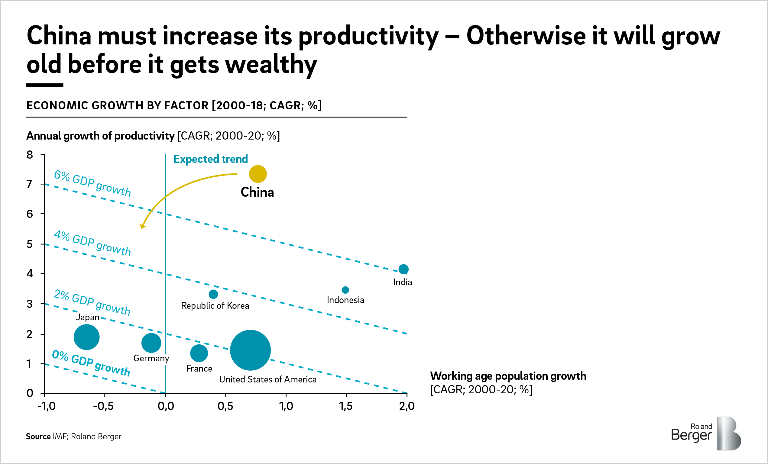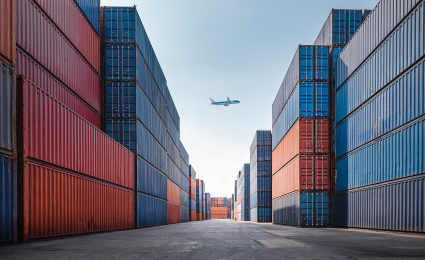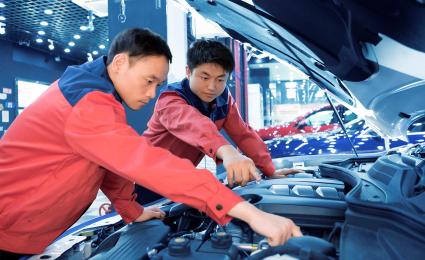We are having a look at the current OECD TiVA database, which is is the most reliable source of substantiated statements on changes in global value chains


The new China story
By Denis Depoux
Why the Chinese economy will continue to offer plenty of opportunity for multinationals
In the past four years the Chinese economy has faced a number of challenges, mainly in the shape of tariffs and sanctions imposed by the US and, more recently, the resurgence of Covid-19. Furthermore, the current geopolitical instability has fueled discussions about a possible decoupling of supply chains from the Chinese economy. At the same time, China's economy is undergoing a profound transformation. China has ceased to be the low-cost country with few regulations and a stable political environment. How should multinational companies react to the challenges that come with these instabilities? Should they reduce their footprint in China or leave the market altogether?

We argue that the short-term instabilities should not obscure the medium- and long-term growth opportunities offered by the Chinese economy. It will therefore continue to be important and right for multinational companies to invest in China. But multinationals must understand the new China story: Increased politicization of business and an internal market that is growing in size and importance – and is very different from other markets, calling for business model localization.
"Going forward, new markets revolving around the modernization and the decarbonization of the Chinese economy will yield opportunities for multinational companies."
Trade war, resurgence of Covid-19, war in Ukraine: The Chinese economy is under pressure
The quiet times of conflict-free globalization were already a thing of the past before the coronavirus pandemic broke out in China: The trade war with the US and the accompanying technology import restrictions had left their mark. The country was also struggling with energy shortages.
In early 2020, the situation was exacerbated by the outbreak of the Covid-19 pandemic. Then Russia's invasion of Ukraine had negative consequences for China, too. For example, exports to Russia plummeted by 48% between January and March 2022, while exports to EU countries fell by 15% in the same period.
All of this has had significant consequences for consumers, with consumption falling and unemployment rising. Consumption of all consumer goods fell 11% in April 2022 compared with the prior year, for example. The slump in car sales was even more dramatic, with consumption plummeting 48% year-on-year.
In view of these problems, it's becoming increasingly clear that China's former success story is no longer such a success: The labor cost advantage is shrinking, regulation is increasing, output per capital employed is falling, and total factor productivity is lagging behind Western competitors. Continuing the success story of the Chinese economy thus requires a new China story. But this can build on the structural foundations of China's success story of recent decades.
The structural foundations of China's success remain intact
The four structural foundations on which the success of China's economy has rested in recent decades remain intact, but they will have to prove themselves and reinvent themselves under changing geopolitical and economic conditions.
First, China remains the powerhouse and the engine of the global economy, particularly in industrial manufacturing , as evidenced by the rapid recovery of China's GDP after the first coronavirus wave (up 8%) and the strong 30% increase in exports over the same period.
Second, China has a huge domestic market and the corresponding demand – and the middle class is growing rapidly. Third, the Chinese economy is tightly integrated into global value chains. And fourth, the Chinese leadership is always ready to stimulate the economic cycle in difficult situations with the help of fiscal policy, monetary policy, industrial policy and structural reforms.
Under changed geopolitical and economic conditions, however, these fundamentals will only actually lead to new growth for the new Chinese economy if China's companies and China's economy transform themselves. For Western investors and companies, this means that the "old" China story is no longer a guarantee of success. So foreign companies also need to understand the transformation of the Chinese economy that is now becoming increasingly apparent.
The Chinese economy will undergo a transformation driven by modernization and decarbonization
China's economy will not grow as fast in the future as it did in the past, especially in the period between its accession to the WTO and the financial crisis of 2008, when double-digit GDP growth rates were recorded consistently. But even if China's growth rate were to be "only" 4-6% in the future – in the first quarter of 2022, the Chinese economy grew by 4.8% – growth in China would still be far higher than in Europe and the United States.
Given this environment, the primary goal of the Chinese leadership is to continue to maintain stable growth by addressing the following challenges and transformation tasks:
China faces the challenge of having to increase its productivity fast enough to not suffer a decline in growth due to the foreseeable aging of its population. In terms of gross domestic product per capita, China lags well behind the world's most productive economies. In a nutshell, China faces the challenge of aging before everyone gets wealthy.
So China has no choice but to consistently focus on modernizing its industry to increase productivity through higher innovation and the use of high-tech and robots.
Initial successes are already visible: Purchasing power-adjusted spending on research and development has risen significantly in the last decade and is approaching the level of the United States. In the manufacturing sector, especially in electric cars and mobile phone equipment, Chinese companies are now at the forefront of the world in terms of technology – partly as a result of the "Made in China 2025" economic plan launched by the Chinese government, which aims to ensure that Chinese manufacturing is no longer the "workbench" for foreign companies but that Chinese companies can cover all levels of the value chain.
In addition, China is focusing on decarbonizing its economy as a growth driver – a strategy aimed at medium-term success, as the economy is still heavily dependent on coal as an energy source, and rapid decarbonization – especially a coal phase-out – would be accompanied by substantial economic losses.
Furthermore, the Chinese leadership has turned its attention to reducing social inequality in the country. To achieve this, it is also prepared to accept short-term growth losses.
All of these upcoming transformation tasks go hand in hand with unprecedented market interventions and a less stable regulatory environment.
China remains attractive for multinationals, but the business environment is changing
China will continue to strengthen its economic productivity and expand its position in the global economy in the coming years. At the same time, the Chinese domestic market will continue to become more attractive, and competition for this market will increase.
So for multinational companies and investors looking for growth and profit, there is still no way around China. The country will remain an attractive market, a superior industrial cluster, and an increasingly efficient innovation hub. However, multinational companies and investors will have to adjust to the changed framework conditions (political measures to reduce social inequality, industrial policy measures, greater integration of China into regional value chains).
What this means is that multinationals will have to work more "in China for China" in the future in order to satisfy the needs and the demand of the domestic market as well – not only in production but also and especially in research & development. While we don't expect a major decoupling of supply chains, multinational companies will need to develop business models suited to the specifics of the Chinese market, including innovation, technology, marketing approaches, payment systems and branding. Joint ventures between multinationals and Chinese technology leaders are already pointing the way.
For most multinationals in China, the opportunity costs of leaving, scaling down or even freezing investments in the medium term are too big to face. However, shareholder and stakeholder concerns around political as well as operational issues need to be addressed.
We believe that with our longstanding experience in China, Roland Berger has assembled a comprehensive toolbox to specifically support the business of multinational corporates in China. Most of all, as the global environment grows increasingly unstable and unpredictable, it is critical to define and understand all of the risks. Hence, we introduced the "onion model" to help multinationals better comprehend the current situation by segmenting the overwhelming risks into a more accessible matrix categorized by two key questions: "where is the risk stemming from – China or the West?" and "is the risk manageable?".
It is based on the idea that when you peel an onion layer by layer, tears will come out of your eyes until you reach a certain point – this being the sensitive core of risks that multinational corporates need to avoid. With this model, it is much easier for multinationals to understand what risks can be mitigated and vice versa.
Then, we can delve into the holistic solutions that are tailored to your specific industry and company, leveraging our strong competency and strategy consultancy, to mitigate the manageable risks, aiming for both short-term quick wins and mid-to-long-term transformation of engagement models and business models, and cautiously avoid the risks that should not be touched. With our ample experience and a proven toolset, Roland Berger will strengthen all kinds of leading businesses and support multinational corporates in their pursuit of excellence in the new China story.
Sign up for Roland Berger Email Updates to receive regular news and invitations related to international growth markets, including investment opportunities in various countries, directly in your inbox.


